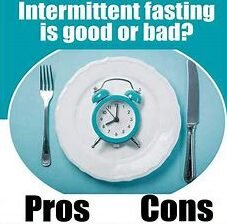Intermittent fasting (IF) is a popular eating pattern that cycles between periods of fasting and eating. It has gained attention for its potential health benefits as well as some challenges

Pros of Intermittent Fasting
1. Weight Loss and Fat Loss
- Caloric Restriction: IF can help reduce overall calorie intake by limiting the eating window, which may lead to weight loss.
- Increased Fat Burning: Fasting periods can enhance fat-burning processes, helping to reduce body fat.
2. Improved Metabolic Health
- Insulin Sensitivity: IF can improve insulin sensitivity, reducing the risk of type 2 diabetes.
- Lower Blood Sugar Levels: It may help stabilize blood sugar levels and reduce insulin spikes.
3. Enhanced Brain Health
- Cognitive Function: Some studies suggest that IF may improve brain function and protect against neurodegenerative diseases.
- Neuroplasticity: Fasting periods may promote the growth of new neurons and enhance brain plasticity.
4. Reduced Inflammation
- Anti-Inflammatory Effects: IF has been shown to reduce markers of inflammation, which is linked to various chronic diseases.
5. Longevity and Aging
- Cellular Repair: Fasting triggers autophagy, a process where cells remove damaged components, which may contribute to longevity.
- Anti-Aging Effects: Some research suggests that IF may have anti-aging benefits and promote a longer lifespan.
6. Simplified Eating Routine
- Fewer Meals: IF can simplify meal planning and reduce the time spent preparing and eating food.
- Flexibility: There are various IF methods (e.g., 16/8, 5:2, eat-stop-eat) that can be tailored to individual preferences and lifestyles.
Cons of Intermittent Fasting
1. Hunger and Cravings
- Increased Hunger: Fasting periods may lead to increased hunger and cravings, making it difficult to stick to the regimen.
- Overeating Risk: Some individuals may overeat during eating windows, negating the calorie deficit.
2. Nutrient Deficiency
- Limited Nutrient Intake: Restricting eating windows can make it challenging to meet nutrient needs, potentially leading to deficiencies.
- Unbalanced Diet: Focusing too much on the timing of meals may result in neglecting the quality of food consumed.
3. Social and Lifestyle Challenges
- Social Interactions: IF can interfere with social events and meals, making it challenging to maintain in social settings.
- Daily Routine Disruption: Adjusting to new eating patterns can disrupt daily routines and activities.
4. Potential Health Risks
- Not Suitable for Everyone: IF may not be suitable for individuals with certain medical conditions, such as eating disorders, diabetes, or pregnancy.
- Side Effects: Some people may experience side effects like headaches, fatigue, or irritability during fasting periods.
Conclusion:
Intermittent fasting offers several potential health benefits, including weight loss, improved metabolic health, and enhanced brain function. However, it also comes with challenges like increased hunger, potential nutrient deficiencies, and social and lifestyle disruptions. It’s important to consider individual preferences, health conditions, and lifestyle factors before starting IF. Consulting with a healthcare professional can help determine if IF is a suitable and safe option for you.
